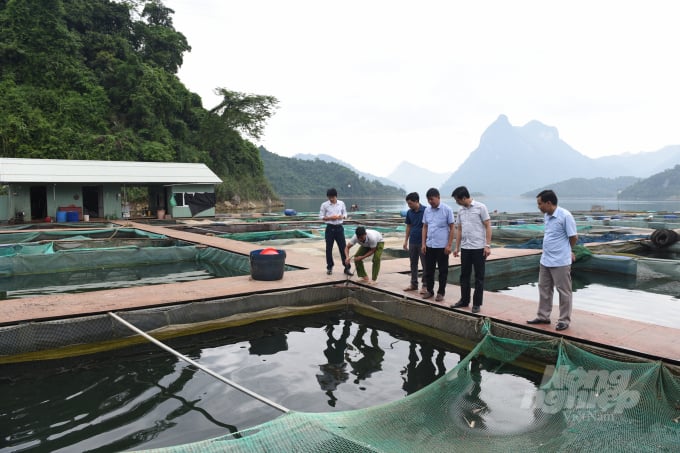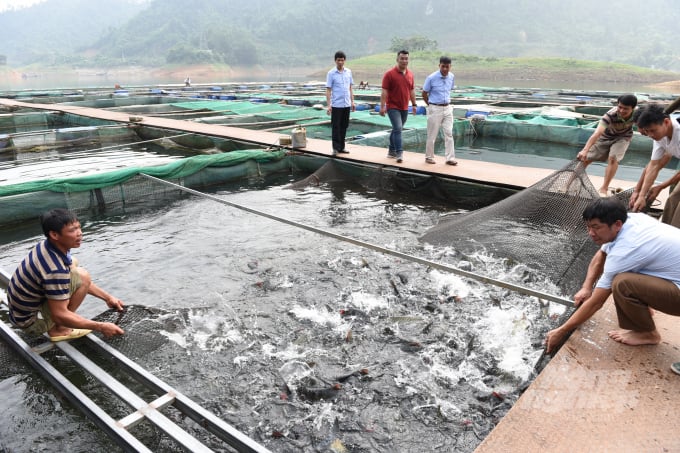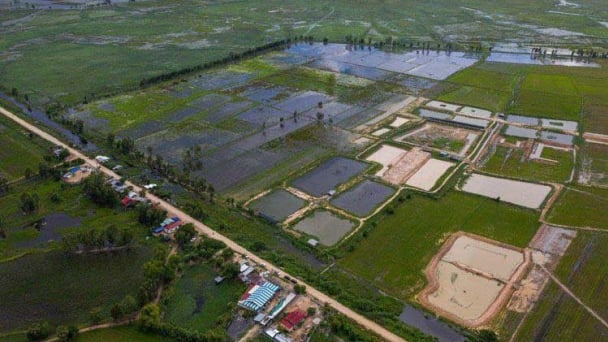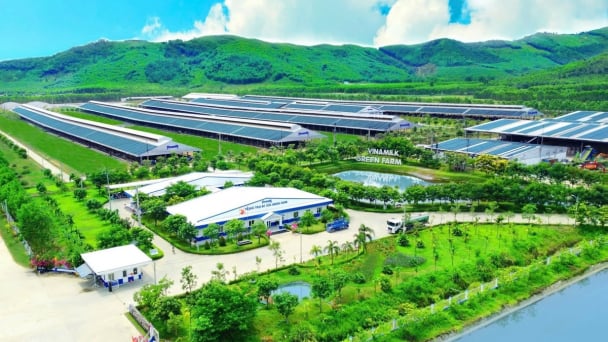May 17, 2025 | 03:29 GMT +7
May 17, 2025 | 03:29 GMT +7
Hotline: 0913.378.918
May 17, 2025 | 03:29 GMT +7
Hotline: 0913.378.918

With over 8,000 hectares of water surface area, Na Hang district has great potential for fish farming. Photo: Dao Thanh.
With more than 8,000 hectares of water surface, Na Hang Ecological Lake is a source of natural fresh water and has an abundance of aquatic species which creates favorable conditions for the locals to develop aquaculture. Na Hang district now has around 100 households raising fish on the waters of the lake focusing on specialty fish species such as crystal-eyed catfish and denti carp with a production of 550 tons per year. Fish cage aquaculture is now mainly concentrated in the communes of Son Phu, Yen Hoa, Da Vi and Na Hang town.
Vi Ngoc Quy, Head of Na Hang Office of Agriculture and Rural Development said most of the fish raised on the waters of Tuyen Quang hydropower reservoir are safe and clean. Up to now the district has four OCOP fish products rated between 3 and 4 stars
To boost the development of local aquaculture industry, the district's agricultural office proposed Na Hang People's Committee to make plan for developing agriculture in the district in the 2021-2025 period. The focus will be seasonal farming, adapting to changing climate, adopting advanced technology in agriculture and aquaculture, combining fish farming with ecotourism and water resource protection
Truong Tuan Minh one of the large-scale fish farmers on Na Hang Lake said the biggest advantage of farming fish here is making use of clean natural water resources and an abundance of aquatic species that can be fed to farmed fish as an alternative feed. He now has 30 cages raising crystal-eyed catfishs and denti carps. His fish farming establishment certificated by VIETGAP provides 120 tons to 150 tons of specialty fish to the market every year, creating regular jobs for four workers with the salary of VND4.5 million per person per month.
According to Tuan although cage fish fed with natural fish can’t grow as fast as those fed with industrial feed the quality of fish meat is better; therefore his fish are preferred to fish from conventional farms. Particularly, restaurants and hotels extremely care about the quality.
Vi Anh Duc Director of Nhat Nam fish farming cooperative (Na Hang district), the largest fish farming facility on the waters of Tuyen Quang hydropower reservoir, said before 2009 they could sold fish to small traders for low prices because their fish was not officially certificated.

Safe fish farming is not only good for environment but also brings Na Hang agricultural products to a higher level. Photo: Dao Thanh.
Thanks to high quality and effective trade promotion activities Nhat Nam cooperative’s fish has become popular for consumers and has been put up for sale at many restaurants and food stores in many big cities such as Ha Noi, Viet Tri, Thai Nguyen for more than a year now. One kilogram of crystal-eyed catfish is now priced at VND450,000-470,000 depending on weight while denti carp is sold for VND150,000-200,000 per kilogram, 25-30% higher than the previous prices when the cooperative didn’t get OCOP certification.
To promote safe fish farming in connection with value chain development, Tuyen Quang provincial authority issued Resolution No.3 dated July 16, 2021 on supporting the development of agriculture, forestry and aquaculture, OCOP products and new-style rural area building in the province during the 2021-2025 period.
In particular, under the policy the province’s fishery industry will get financial support to expand farming activities, especially value chain-based linkage models and develop star-rated OCOP products.
To achieve the goal, Tuyen Quang has promoted aquaculture spatial planning such as pond or small lake planning for raising fish; reservoir cage aquaculture planning and river cage aquaculture planning.
Fish cage raising has mainly taken place in the districts of Na Hang, Lam Binh, Chiem Hoa, Ham Yen, Yen Son, Son Duong and Tuyen Quang City. Fish cage aquaculture production is expected to reach 1,654 tons with nearly 2,000 cages of specialty fish. The province planned to grow tilapia on 200 hectares of water surface with an output of 1,183 tons by 2025.
Tuyen Quang province set a target of 14,000 hectares of cage aquaculture by 2035 including 12,000 hectares taken advantage of reservoirs, reaching 2,500 fish cages in total with a production of 11,000 to 12,000 tons.
Translated by Mai Tham

(VAN) Vietnam’s TH Group officially put its high-tech fresh milk processing plant into operation in the Russian Federation, marking a historic moment as the first TH true MILK cartons were produced in Russia.

(VAN) Use of high-quality broodstock and biotechnology is regarded as the most effective approach to ensuring sustainable and economically viable shrimp aquaculture ahead of climate change and the emergence of increasingly intricate disease patterns.

(VAN) Carbon farming is a form of agricultural practices that helps absorb more greenhouse gases than it emits, through smart management of soil, crops, and livestock.

(VAN) This is a key content of the Memorandum of Understanding recently signed between the Vietnam Fisheries Society and Kunihiro Inc of Japan.

(VAN) To achieve the goal, local authorities and businesses in Kon Tum province have fully prepared the necessary conditions for the new Ngoc Linh ginseng planting season.

(VAN) Jiangsu province is gearing up to host training programs in Phnom Penh, the capital of Cambodia, this year to establish the Fish and Rice Corridor.

(VAN) Le Hoang Minh, representing Vinamilk, shared the company's experience in energy saving and green energy transition for production at a workshop held during the P4G Summit.